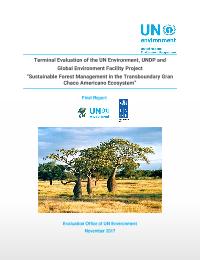
Evaluación del proyecto regional PAS CHACO
This report presents the findings, lessons and recommendations of the Terminal Evaluation (TE) of the GEF-UN Environment project that “Sustainable Forest Management in the Transboundary Gran Chaco Americano Ecosystem”. The project was co-implemented by UN Environment and UNDP, and executed by the governments of Argentina, Bolivia and Paraguay with the Organization of American States (OAS) providing a supportive role as regional executing agency for the UN Environment portion of the project. Project performance and impact were assessed according to criteria that included relevance, efficiency, effectiveness, sustainability, preparedness, participation and ownership among others. The evaluation field visits were conducted during October and November 2016, considering the project’s scheduled termination in December; however, the project partners decided to extend the project administratively (and programmatically in the case of Paraguay) until June 2017. Some pilot initiatives were also continuing to develop in Bolivia. As a result, some aspects of the project’s final delivery in 2017, particularly the case of Paraguay, may not be fully captured by the TE.
Output 1.1. National and sub-national systems and institutions enabled to achieve structural transformation of productive capacities that are sustainable and employment - and livelihoods- intensive
1: Others
2: Poverty and MDG



Fondos que forman parte del componente administrado por la OEA, PNUD no adiministra estos fondos.